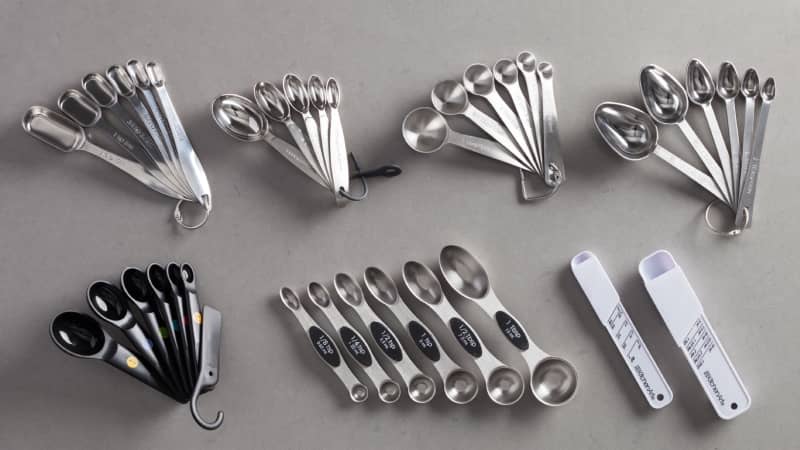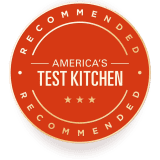Liquid Measuring Cups
Equipment Review
Small design elements make a big difference.
Published Dec. 1, 2018. Appears in Cook's Country TV Season 13: Motor City Favorites

We stock approximately 200 measuring spoons in the test kitchen, as our cooks use them to measure everything from baking soda to olive oil. And while these tiny tools appear to be straightforward, a seemingly innocuous detail—numbers that are printed on the handle and fade over time or a connector ring that requires too much effort to pry open—can make some sets a pain to use.
We've stuck by our tried-and-true winning measuring spoons from Cuisipro for years, but with so many new designs on the market, we decided to retest. We chose seven sets priced from $4.99 to $16.68, all containing at least the five measures we frequently use in our recipes: 1 tablespoon, 1 teaspoon, ½ teaspoon, ¼ teaspoon, and ⅛ teaspoon. (We consider other sizes to be nonessential, so we excluded those individual spoons from testing where applicable.) The sets varied in design: Some were traditional, with a round bowl connected to a handle, and some were double-sided spoons that resembled barbells—a straight handle with a bowl on each end. One set also had bowls with sliders, which allowed us to adjust the measurement sizes.
We tested spoons for accuracy; repeatedly removed each spoon from the set and reattached it; measured ingredients of various textures (table salt, dried basil, ground turmeric, red pepper flakes, peanut butter, and brown sugar); and washed each set 20 times. We also asked users—some with large hands, others with small hands—to test each set. At the end of testing, we rated the spoons on accuracy, ease of use, and durability to form our rankings.
Accuracy is essential in cooking, especially when baking, so we tested accuracy with both water and unbleached all-purpose flour. We used our recommended dip-and-sweep method and weighed each spoon's contents on a high-precision scale to the hundredth of a gram.
Most measuring spoons were within an acceptable range, and any inaccuracies in the smaller spoons—the ½-, ¼-, and ⅛-teaspoon measures—were mere fractions of a gram. Of the larger spoons, though, three were problematic. When we measured water, one of the 1-teaspoon measures held, on average, 35 percent less than it should have. And when we measured flour, two 1-tablespoon measures ran too big—one model held roughly 32 percent more flour than it should have, and the other held a hefty 41 percent more.
Our test cooks design recipes to work even if you aren't using perfectly calibrated measuring tools, and we found the smaller spoons'inaccuracies perfectly acceptable given that they were off by only tenths of a gram. But we downgraded 1-teaspoon and 1-tablespoon measures that were inaccurate by 30 percent or more, as t...

The mission of America’s Test Kitchen Reviews is to find the best equipment and ingredients for the home cook through rigorous, hands-on testing. We stand behind our winners so much that we even put our seal of approval on them.

This is a members' feature.